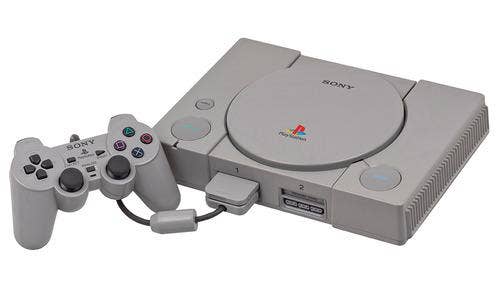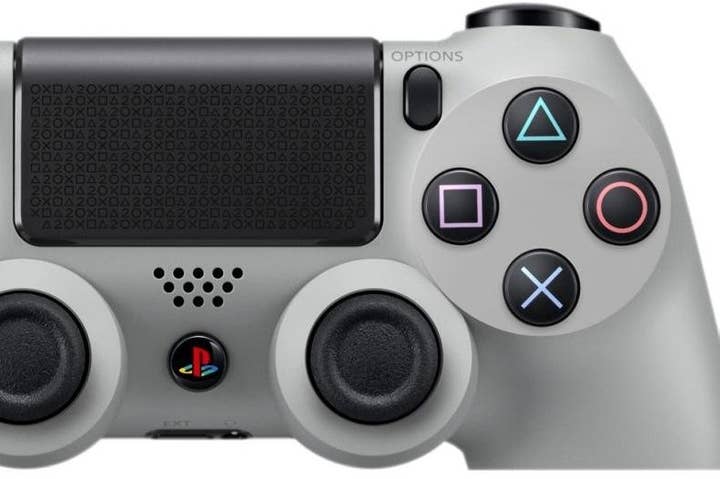The 20 Years When Games Grew Up
Celebrating PlayStation also means embracing what Sony did to the market: took games out of the basement
The 20th anniversary of the PlayStation has been greeted and celebrated in all sorts of different ways this week. For Sony, it was a reason to look back over 20 years of genuine success, of a kind that's been in short supply for many of the firm's other divisions during that time; and of course, to issue a limited edition PS4 in the livery of the original 1994 PlayStation, which I obviously entered the lottery to pre-order because I obviously have nothing better to do with my money since I'm obviously a gullible idiot who's easily distracted by shiny objects.
For Sony's rivals, it was a moment in which to be magnanimous in congratulations; for gamers who recall the 1994 launch, it was a moment in which to go "oh god, seriously, twenty years?" and rush to the mirror to count white hairs. For those still in the bloom of youth, it was an opportunity to say "hey, I remember my dad / older brother / cousin having one of those" before going back to updating Tumblr on their iPads, playing League of Legends against opponents across the world on computers whose graphics cards alone are more powerful than a room-filling Cray, using high speed wireless data connections and ultra-powerful pocketable computers with multi-megapixel digital cameras built-in to send pictures of their junk over the ether, and generally participating in a bewildering future that most of us in 1994 would have dismissed as utterly far-fetched.
What I'm saying, if you've just come back from checking those white hairs in the bathroom mirror, is yeah; we're old now. The world has moved on greatly since Sony's grey box turned the games industry on its head 20 years ago, and our lives have moved on greatly as well. Some things don't change; a clash of cultures still swirls at the heart of gaming, a clash whose origins, in many senses, can be found right back in the era of the original PlayStation. Yet other things have changed greatly; most of the battles that looked impossible 20 years ago have already been won, others turned out not really to be battles at all, and a great many of us have found ourselves on quite the opposite side of cultural clashes from where we might have expected to be, back in the beginning.

I'm very much a product of the PlayStation era. My first home console was a PlayStation, and its arrival marked the start of my career as a games writer. My parents, like many of their era, didn't have much time for games consoles; they approved of computers, which could be programmed and learned and used for homework, but not of consoles, which mostly seemed to be good for shouting at or for conducting genocide against populations of highly evolved mushrooms.
Having learned a fair bit of web programming (so I guess my folks' insistence on "real" computers paid off to some extent), I was working, at an unusually tender age, for an Irish Internet magazine writing technical articles when a friend introduced me to a handful of games on his shiny new PlayStation; including Final Fantasy VII, which I instantly loved to bits and simply had to play. I pitched a games column to the magazine I was working on, which they accepted, then rang Sony and told them I was writing a games column, and would therefore need a PlayStation. To my eternal surprise, they actually sent me one; I promptly spent the next four days solid playing Final Fantasy VII, an experience made even more tense and exciting by the fact that I didn't initially know about memory cards and had to wait until a trip to the city the following week to actually get my hands on one.
"PlayStation was a brand that deliberately divorced itself from Nintendo's family friendly image and instead courted controversy, pushing creative boundaries both in its games and its marketing"
I wasn't very aware of the launch of PlayStation, then - I was a very devoted PC gamer at that point - but I was close enough. Many others, just a few years older than I, will remember the launch more clearly, but for me, in retrospect, it's still a pretty momentous point in the industry. All sorts of things stemmed from Sony's entry into the market. It sealed Sega's fate as a hardware manufacturer, and created the market conditions and the model that Microsoft would follow for its own entry into the market. It tore the carpet from under Nintendo, which wouldn't return to dominance in the home console market until the remarkable, and perhaps once-off, success of the Wii. Moreover, and perhaps with more lasting effect, Sony took a whole new approach to games that changed the culture of the medium forever; an approach whose ripples are still felt strongly today.
If you didn't live through the PlayStation era of the mid-nineties, it's hard to summarise just how exciting it was to watch Sony - and publishers emboldened by Sony - tear through conventions around videogames. What the company identified early on was that even though games were still considered to be a children's pastime, they didn't need to be so; lots of adults played, especially on PC, and while many people seemed to ditch games as a pastime as they grew up, there was no reason that had to be the case. Console games' limited appeal to youths and adults was a consequence of self-ghettoisation; if you only make games for children, by and large, only children will play.
Sony wasn't the first company to try to break those unwritten rules, but it was the most comprehensive success. The ways in which the firm and its publishing partners overturned videogames' image have been well-documented, and are beyond the scope of this article (although there's probably a great book in it, should anyone choose to write one). From putting PlayStation demo pods in nightclubs and hooking into ascendant UK dance music culture with the soundtrack to WipEout (and, yes, that very knowingly capitalised letter), to giving publishers like Capcom the creative freedom to run hugely controversial campaigns for Resident Evil and its ilk, PlayStation was a brand that deliberately divorced itself from Nintendo's family friendly image and instead courted controversy, pushing creative boundaries both in its games and its marketing and revelling in the "ban this sick filth" reactions it provoked from the conservative media.
Much of this was purely cynical marketing; if we start declaring people heroes on the basis that they pissed off the tabloid press in the 1990s, we'll be here all week. Yet the movement itself was important. Games needed the creative space to explore new themes and new ideas, and PlayStation gave it to them, yielding one of the most creatively fertile generations the medium has ever enjoyed. It worked not just because it was challenging the easily offended; all too many people find some kind of perverse value in offending the easily offended, but giving offence in itself is just pointless, infantile rudeness unless there's some kind of value underlying it. For PlayStation in the 1990s, there was; the value was an extraordinary demographic expansion of the videogame audience.
PlayStation got more and more people playing with each push beyond games' traditional comfort zone. It took a pastime which had been almost exclusively the preserve of children and a very, very geeky minority (groups in which I enjoyed dual membership at the time) and turned it into something that spanned a full range of ages, ethnicities, genders, socio-economic groups and interest groups. Sure, not everyone was represented equally, but everyone was there, brought in underneath the extraordinarily broad canvas Sony was unfurling.
"We're the generation that lived through this enormous, wonderful demographic expansion of videogames; the generation old enough to remember when this truly was a niche, ghettoised pastime"
Twenty years on, we can look back at pretty much all the battles that were sparked off during that amazing expansion of the medium's appeal, audience and subject matter and say with certainty; we won. As the appeal of games inexorably spread and the audience gradually came to encompass more and more of the population, the scope for "ban this sick filth" headlines slowly collapsed. Games became, for a solid majority of people, a form of media, entertainment and art that is both unique in its own right, and gradually earning respect equal to all others.
In part, it's the very fact that 20 years passed which made this possible. It's changed games; it's also changed all of us. If, like me, you were a teenager when the first PlayStation appeared, you're well into your thirties now; I'll spare those even older from the awful calculations, but the point is, many of PlayStation's early converts now have their own families (old enough for a co-op game with mum or dad on PS4 this Christmas, in many cases) and all have their own accumulated life experiences. If you look at it that way, the triumph of games was inevitable; the generation whose parents disapproved of Resident Evil or WipEout is now a generation of parents themselves, and the disapproval has evaporated on the wind.
We're the generation that lived through this enormous, wonderful demographic expansion of videogames; the generation old enough to remember when this truly was a niche, ghettoised pastime... And that, perhaps, is the sad epilogue to the otherwise triumphant tale of PlayStation, because there's always a backlash, isn't there? For those of us old enough to remember where things were in 1994, nothing could be better than seeing how broad a church games have become.
For a small, loud minority of those far too young to recall the world before PlayStation, though, the church is altogether too broad and further expansion - bringing with it new ideas, new approaches, new players and new creators, vital breaths of fresh air to keep our medium exciting and interesting - is simply threatening. Thus, some of us find ourselves repeating the same refrain we used to all those years ago; games aren't just for geeks. They haven't been just for geeks, or just for any single group you care to name, since 1994 rolled around; and that's the best thing that's ever happened to this medium. Nobody gets to roll back that clock; today, with freely available development tools and the amazing democratisation of digital distribution, both playing and making games is for everyone, the next logical step in a movement that Sony, perhaps inadvertently, set in motion back in 1994. "This is for the Players", announces Sony's most recent slogan for its latest PlayStation iteration; the unspoken coda is that today, after 20 years of PlayStation, everyone is a player.

